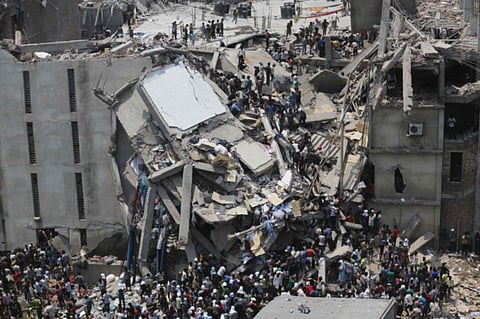Bangladesh May Day protesters want death penalty for factory owner
Workers of the world show solidarity for victims of deadly building collapse in Bangladesh

Dubai: Thousands of workers paraded through central Dhaka on May Day to demand safety at work and the death penalty for the owner of a garment factory building that collapsed last week in the country’s worst industrial disaster, killing at least 395 people and injuring 2,500.
A raucous procession of workers on foot, pick-up trucks and motorcycles wound its way through central Dhaka on Wednesday. They waved the national flag and banners, beat drums and chanted “direct action!” and “death penalty!”
From a loudspeaker on the back of a truck, a participant spoke for the group: “My brother has died. My sister has died. Their blood will not be valueless.”
May Day protests, customarily an opportunity for workers in this impoverished South Asian nation to vent their grievances, have taken on a poignant significance this year following the April 24 disaster.
Five garment factories were housed in the illegally constructed, eight-story Rana Plaza that collapsed in this Dhaka suburb. Five months after a fire killed 112 people at another clothing factory, the collapse again exposed safety problems in Bangladesh’s garment industry, which is worth $20 billion annually and supplies retailers around the world.
In Greece, public transport was disrupted on Wednesday as unions staged a 24-hour strike to protest the government’s austerity measures.
Ferries remained docked across the country, rail services were halted and hospitals were functioning with skeletal staff.
The unions were planning to hold a rally through the centre of Athens later in the day.
The demonstrations on Labour Day are against the government’s plan to cut 15,000 public sector jobs by the end of 2014.
The measures are demanded by Greece’s international creditors in return for releasing an 8.8-billion euro ($11.5 billion) tranche from the rescue package that has kept the government solvent.
This year, however, Greece marks Labour Day on May 7 - which will be a public holiday - to coincide with the Greek Orthodox Easter religious holiday.
In Istanbul, Turkish police and protesters clashed on Wednesday after authorities moved to prohibit traditional Labour Day rallies.
Police used water cannons and tear gas against the demonstrators near Taksim Square. Witnesses reported clashes in several neighbourhoods in the area.
Thousands of Hong Kong residents took to the streets today for Labour Day marches to petition for better labour conditions and in support of strike action by workers at docks operated by billionaire Li Ka-shing.
An estimated 2,600 people joined in a protest this morning organised by the Hong Kong Federation of Trade Unions for workers’ rights, said Kimmy Man, a spokeswoman for the Hong Kong Police Force, in a telephone interview.
Protesters carried a caricature mule and waved placards calling for standardised working hours, fully paid maternity leave, better retirement benefits and against the use of imported labour. The procession marched from Southorn Playground in Wan Chai to the government offices.
The protests underscore rising public discontent at the growing gap between rich and poor in the former British colony. A 7.1 per cent increase in the city’s minimum wage to HK$30 ($3.9) an hour took effect today, as the government attempts to narrow inequality that is at its worst level since records began in 1971.
Sign up for the Daily Briefing
Get the latest news and updates straight to your inbox



